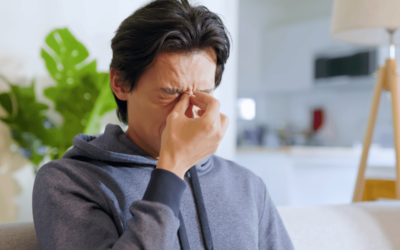If you or someone you care about has an autoimmune condition like rheumatoid arthritis, lupus, or Sjögren’s syndrome, you may already be aware that these diseases can have wide-ranging effects on the body. But did you know they can also significantly impact your vision and eye comfort? Understanding this connection is key to managing symptoms and maintaining optimal eye health. Let’s look at how autoimmune diseases can affect your eyes and what you can do to manage those effects.
Autoimmune diseases and dry eyes
Autoimmune diseases occur when the immune system mistakenly attacks the body’s own cells and tissues. These diseases can affect various parts of the body, including the eyes. Some of the most common autoimmune diseases that impact eye health include:
- Sjögren’s Syndrome: Primarily affects the glands that produce tears and saliva, leading to dry eyes and mouth.
- Rheumatoid Arthritis: Known for causing joint inflammation, it can also lead to dry eyes.
- Lupus: Can cause inflammation throughout the body, including the eyes, resulting in dry eye symptoms.
How do autoimmune diseases lead to dry eye?
Autoimmune diseases can lead to dry eyes in a few different ways, mostly involving inflammation and gland issues:
- Inflammation: Autoimmune conditions often cause inflammation throughout the body. This inflammation can affect the lacrimal glands (which produce tears) and meibomian glands (which produce the oily layer of tears), leading to reduced tear production and poor tear quality.
- Gland Dysfunction: Conditions like Sjögren’s syndrome specifically target glands responsible for moisture production. This results in decreased tear production, making it difficult to keep the eyes adequately lubricated.
- Overactive Immune Response: Sometimes, the immune system’s overdrive can directly damage eye tissues, worsening dryness and irritation.
Recognizing dry eye symptoms with autoimmune conditions
If you have an autoimmune disease, you might notice some of these dry eye symptoms:
- Persistent dryness and discomfort
- A gritty or sandy feeling in your eyes
- Redness and irritation
- Blurred vision
- Sensitivity to light
Managing dry eye with our help
At Northwest Hills Eye Care, we offer dry eye treatment in Austin to help you manage your symptoms. Over-the-counter artificial tears are a popular remedy for dry eyes, but they aren’t always effective for severe or chronic dry eyes. Sometimes, thicker ointments are necessary, especially at night. We might also suggest anti-inflammatory eye drops to help reduce inflammation and boost tear production.
Some patients can benefit from tiny punctal plugs inserted into the tear ducts to keep tears on the surface of the eyes longer. Additionally, lifestyle and environmental changes, such as using a humidifier, wearing sunglasses, and taking regular breaks from screens, can contribute to better eye health.
Keeping up with regular eye exams helps us monitor your symptoms and make any necessary adjustments to your treatment plan. We’re here to support you with personalized care tailored to your needs.
Contact us today to learn more about how we can help manage your dry eye symptoms effectively.



